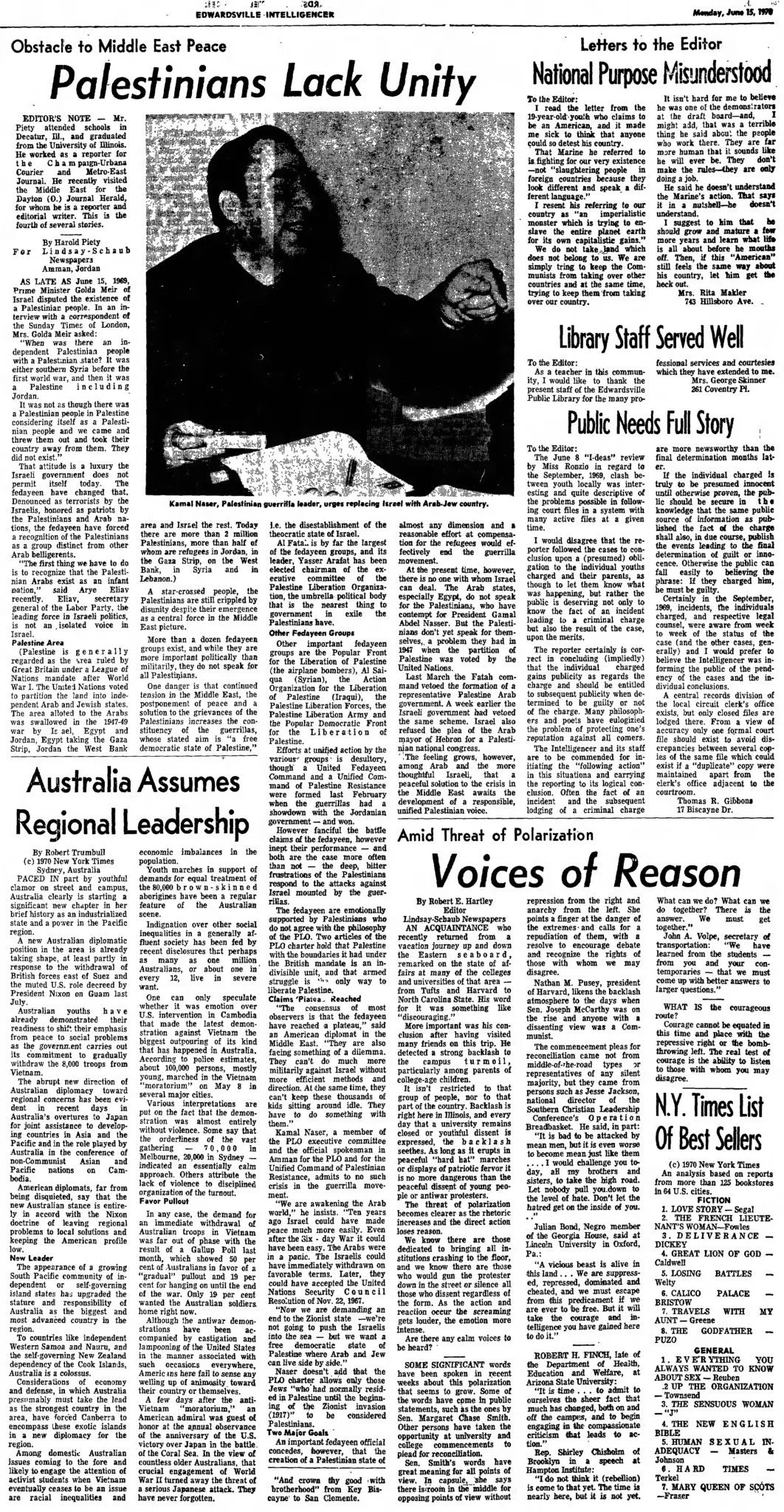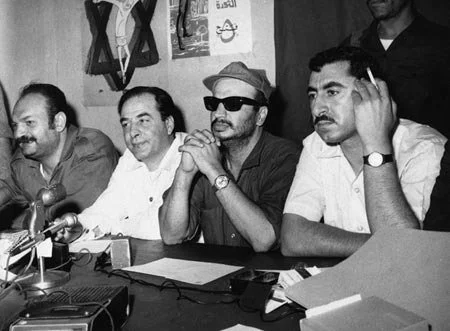Repost: 1970 article on Arab Division and {{Syrianpalaestinian}} Terrorism
Below is an article from Harold Piety for a Jordanian newspaper, written June 15, 1970. Little has changed over 50+ years. I have argued, and will continue to argue, that Arab colonists of Gaza, Judea and Samarea are as divided as ever. Reminder, the keffiyah is banned in Gaza.
The #unityintifada claims are more racist than anything any far right Jew has said about Arabs. While it once was offensive to associate all Arabs with Hamas, Taliban or ISIL, it has apparently become the standard propaganda in justifying #FreePal, sans elections, womens rights, LGBT+, Jews etc.
I have retyped the article for your convenience. I could not find their image of PLO spokesperson and shit poet, Kamal Nasser, so I used a Wiki image with (possibly closetted) PLO leader, Yasser Arrafat. Nasser was involved with the Munich Massacre — a real testament to how evil these Nazi lovers were. [Don’t confuse him with Abdul Nasser Qardash, the Al-Qaeda AND ISIL guy. I know the names are confusing.]
You may note Nasser saying, “we're not going to push the Israelis into the sea.” Which is, of course, because the slogan “From the river to the sea” was always a call for genocide. He is aware of the violence in Palestinian chants, despite your green haired friend insisting they’re just talking about “Zionist Jews peacefully leaving.”
You may also note the repeated use of “Fedayeen.” Today, the word “martyr” is more popular. I actually have no clue why. Either way, it’s referring to suicide-bent Islamists.
Original link: https://timetostandupforisrael.com/2023/04/14/why-israel-cannot-negotiate-peace-1970/
Palestinians Lack Unity
Obstacles to Middle East Peace
Editors Note: Mr. Piety attended schools in Decatur, Ill, and graduated from the University of Illinois. He worked as a reporter for the Champaign-Urbana Courier and Metro-East Journal. He recently visited the Middle East for the Dayton (O.) Journal Herald, for whom he is a reporter and editorial writer. This is the fourth of several stories.
By Harold Piety for Lindsay-Schaub Newspapers, Amman, Jordan
As LATE AS June 15, 1969, Prime Minister Golda Meir of Israel disputed the existence of a Palestinian people. In an interivew with a correspondent of the Sunday Times of London, Mrs. Golda Meir asked:
"When was there an independent Palestinian people with a Palestinian state? It was either southern Syria before the first world war, and then it was a Palestine including Jordan.
It was not as though there was a Palestinian people in Palestine considering itself as a Palestinian people and we came and therew them out and took their country away from them. They did not exist.”
That attitude is a luxury the Israeli government does not permit itself today. The fedayeen have changed that. Denounced as terrorists by the Israelis, honored as patriots by the Palestinians and Arab nations, the fedayeen have forced a recognition of the Palestinians as a group distinct from other Arab belligerents.
"The first thing we have to do is to recognize that hte Palestinian Arabs exist as an infant nation," said Arye Eliav recently. Eliav, secretary general of the Labor Party, the leading force in Israeli politics, is not an isolated voice in Israel.
Kamal Naser, Palestinian guerilla leader, urges replacing Israel with Arab-Jew country. (Wiki image used in place of the original image)
Palestine Area
(Palestine is generally regarded as the area ruled by Great Britain under a League of Nations mandate after World War I. The United Nations voted to partition the land into independent Arab and Jewish states. The area alloted to the Arabs was swallowed in the 1947-49 war by Israel, Egypt and Jordan, Egypt taking the Gaza Strip, Jordan the West Bank area and Israel the rest. Today there are more than 2 million Palestinians, more than half of whom are refugees in Jordan, in the Gaza Strip, on the West Bank, in Syria and in Lebanon.)
A star-crossed people, the Palestinians are still crippled by disunity despite their emergence as a central force in the Middle East picture.
More than a dozen fedayeen groups exist, and while they are more important politically than militarily, they do not speak for all Palestinians.
One danger is that continued tension in the Middle East, the postponement of peace and a soution to the grievances of the Palestinians increases the constituency of the guerillas, whose stated aim is "a free democratic state of Palestine," i.e. the disestablishment of the theocratic state of Israel.
Al Fata... is by far the largest of the fedayeen groups and its leader, Yasser Arafat has been elected chairman of the executive committee of the Palestine Liberation Organization, the umbrella political body that is the nearest thing to government in exile the Palestinians have.
Other Fedayeen Groups
Other important fedayeen groups are the Popular Front for the Liberation of Palestine (the airplane bombers), Al Saiqua (syrian), the Action Organization for the Liberation of Palestine (Iraqui), the Palestine Liberation Forces, the Palestine Liberation Army and the Popular Democratic Front for the Liberation of Palestine.
Efforts at unified action by the various groups is desultory through a United Fedayeen Command and a Unified Command of Palestine Resistance were formed last February when the guerillas had a showdown with the Jordanian government -- and won.
However fanciful the battle claims fo the fedayeen, however inept their performance -- and both are the case more often than not -- the deep, bitter frustrations of the Palestinians respond to the attacks against Israel mounted by the guerillas.
The fedayeen are emotionally supported by Palestinians who do not agree with the philosophy of the PLO. Two articles of the PLO charter hold that Palestine with the boundaries it had under the British mandate is an individisible unit, and that armed struggle is the only way to liberate Palestine.
Claims Plateau Reached
"The consensus of the most observers is that the fedayeen have reached a plateau," said an American diplomat in the Middle East. "They are also facing something of a dilemma. They can't do much more militarily against Israel without ore efficient methods and diredtion. At the same time, they can't keep these thousands of kids sitting around idle. They have to do something with them."
Kamal Naser, a member of the PLO executive committee and the oficial spokesman in Amman for the PLO and for the Unified Command of Palestinian Resistance, admits to no such crisis in the guerilla movement.
"We are awakening the Arab world," he insists. "Ten years ago Israel could have made paece much more easily. Even after the Six-day War it could have been easy. The Arabs were in a panic. The Israelis could have immediately withdrawn on favorable terms. Later, they could have accepted the United Nations Security Council Resolution of Nov. 22, 1967.
“Now are demanding an end to the Zionist state -- we're not going to push the Israelis into the sea -- but we want a free democratic state of Palestine where Arab and Jew can live side by side."
Naser doesn't add that the PLO charter allows only those Jews "who had normally resided in Palestine until the beginning of the Zionist Invasion (1917)" to be considered Palestinians.
Two Major Goals
An important fedayeen official concedes, however, that the creation of a Palestinian state of almost any dimension and a reasonable effort at compensation for the refugees would effectively end the guerrilla movement.
At the present time, however, there is no one with whom Israel can deal. The Arab states, especially Egypt, do not speak for the Palestinians, who have contempt for Preasident Gamal Abdel Nasser. But for the Palestinians don't yet speak for themselves, a problem they ahd in 1947 when the partition of Palestine was voted by the United Nations.
Last March the Fatah command vetoed the formation of a representative Palestine Arab government. A week earlier the Israeli government had vetoed the same scheme. Israel also refused the plea of the Arab mayor of Hebron for a Palestinian national congress.
The feeling grows, however, among Arab and the more thoughtful Israeli, that a peaceful solution to the crisis in the Middle East awaits the development of a responsible unified Palestinian voice.
Is there a unity of Arabs in their hate for {{Zionists}}, or are they destined to always be divided by differences in their extremist beliefs? Can we trust anything the PLO says about peaceful tactics when we know they worked directly with Nazi groups to conduct multiple terrorist attacks? [IMO: No and no]


